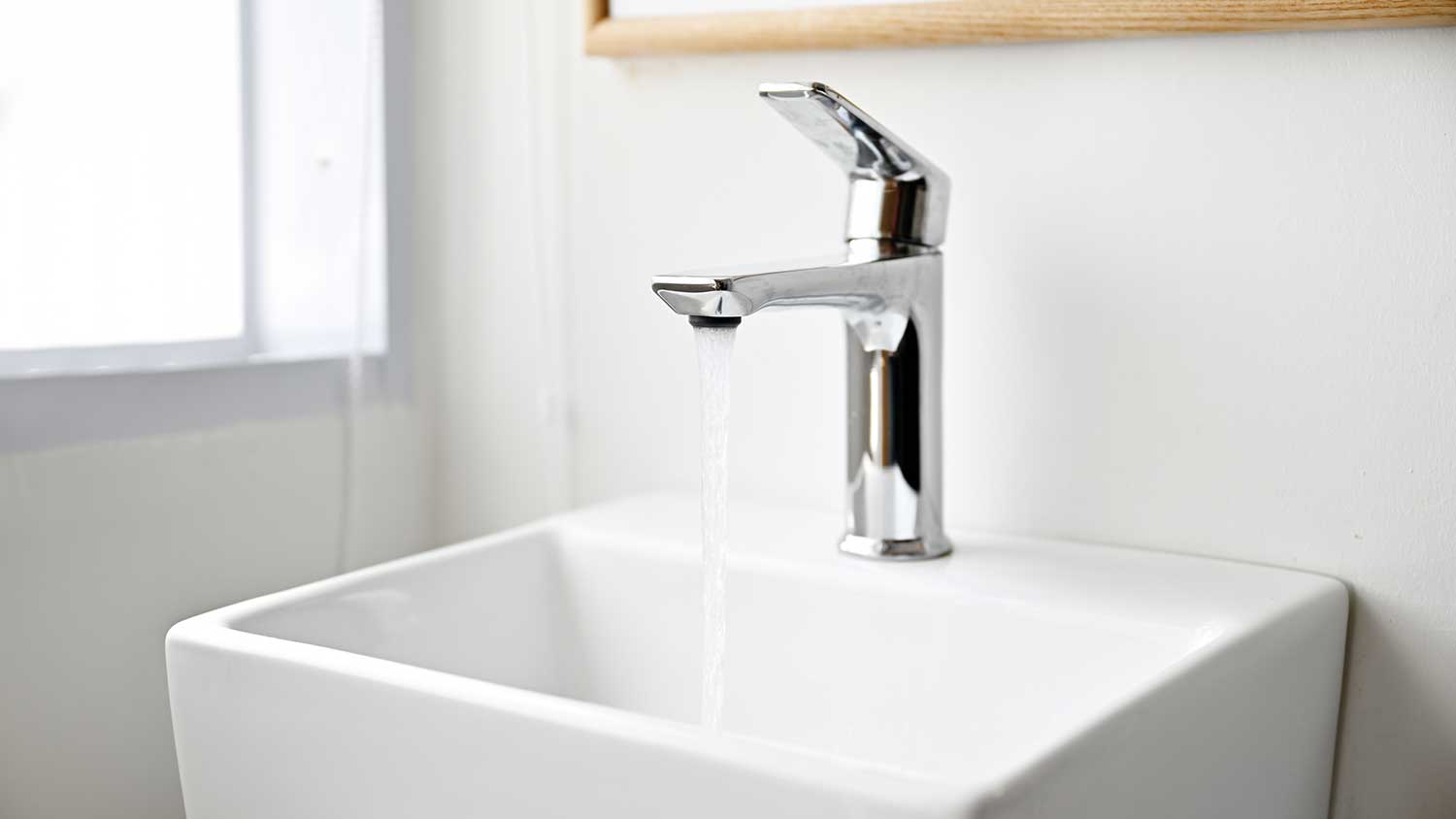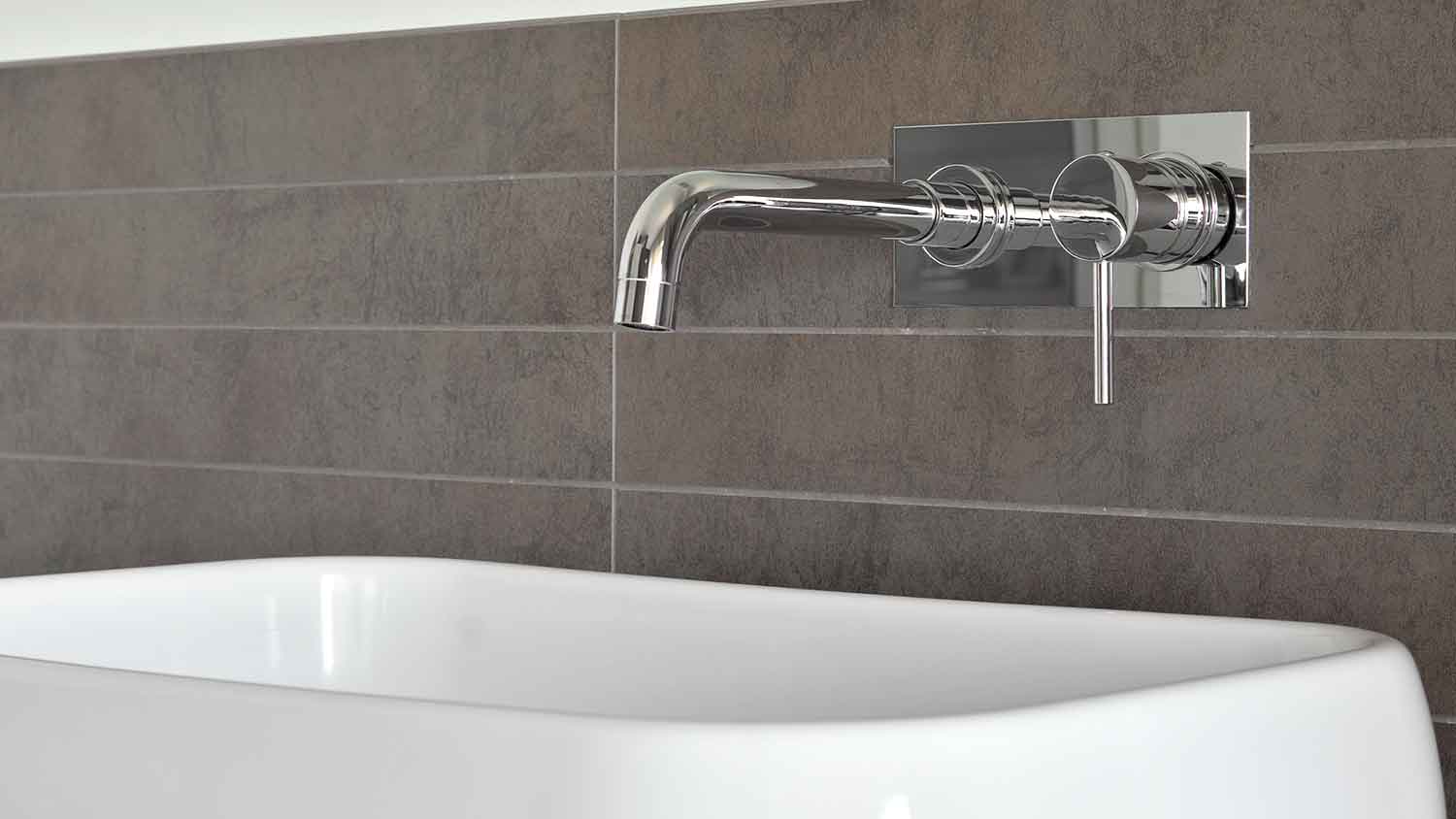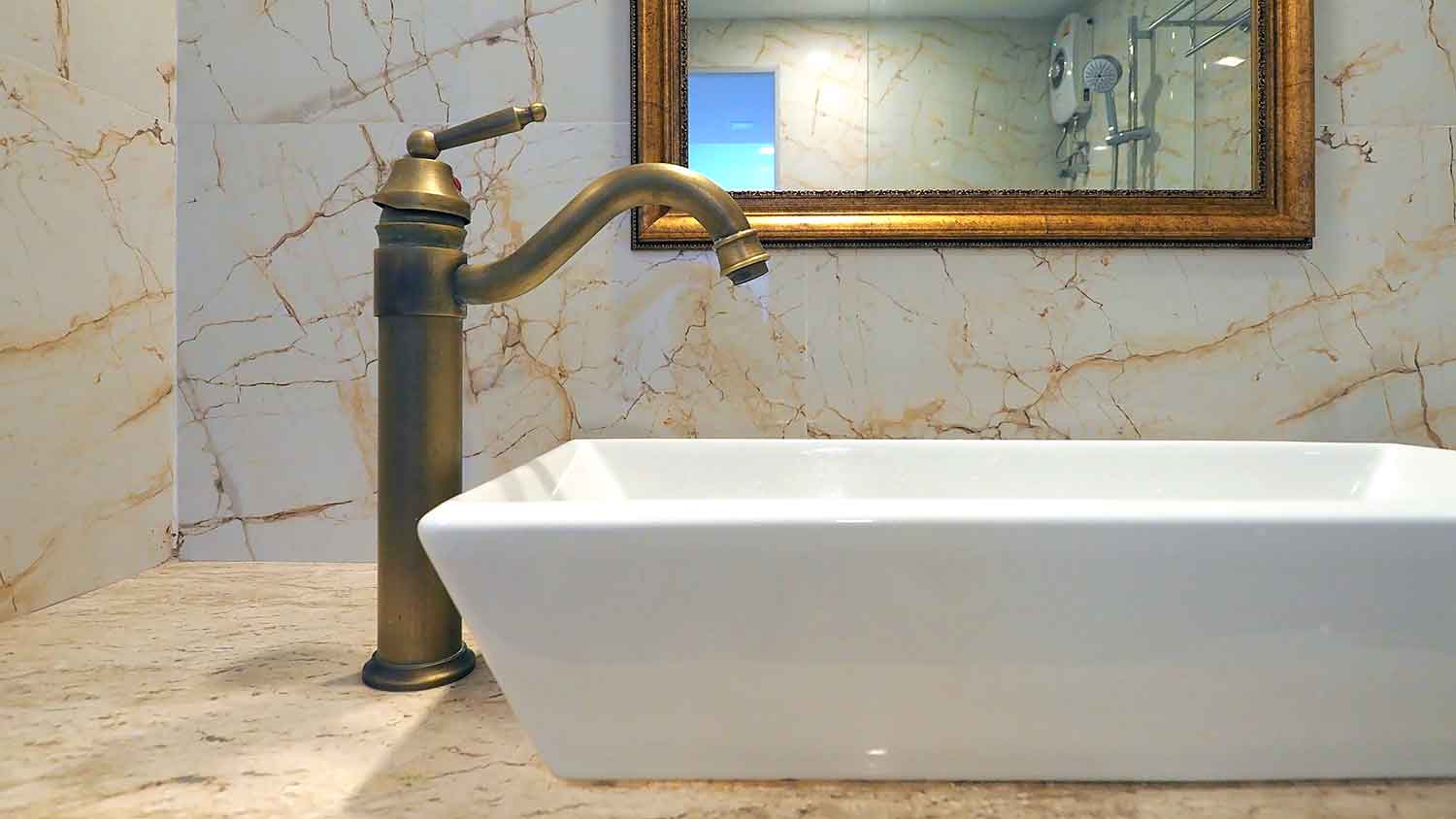7 Different Types of Bathroom Faucets
Find your flow with these bathroom faucet ideas


Nothing helps you get a handle on a bathroom renovation quite like picking out the perfect faucet. A bathroom faucet must be stylish, practical, and able to stand up to the wear and tear of daily use. Today's homeowners can select everything from utilitarian designs to fountain-inspired creations. In this guide, we're leaking the details on the best types of bathroom faucets.

1. Single-Handle Faucet

This first pick is as basic as it gets. As the name suggests, a single-handle faucet features a centered handle that can be adjusted left or right to activate hot or cold water. Pressure is adjusted based on how much you lift the lever. The bonus with a single-handle faucet is that it's an easy choice for a DIY faucet installation. It's also one of the best types of bathroom faucets to pick when space is tight around the sink. While this one won't necessarily dazzle anyone with its design, this budget-friendly, hassle-free faucet style gets the job done when you just need to fix a leaky faucet or upgrade your bathroom faucet quickly.
If you observe a leak in your home, do not procrastinate getting it fixed. This can help prevent future plumbing emergencies and water damage to your home while saving a significant amount of money in wasted water.
| Pros | Cons |
|---|---|
| Saves space on small vanities | Very basic design |
| Easy installation | May be hard for some people to adjust temperature |
| Affordable | Can be difficult to install if the original faucet was a dual-handle |
Best for: Basic bathrooms or homeowners who need a hassle-free faucet
2. Spread-Fit Faucet

You've probably seen this faucet a million times without knowing the style had a name. A spread-fit faucet features a main faucet with two handles for hot and cold water that appear to be "separate." In reality, these pieces are connected below the sink deck or countertop. Most people find that the slight price upgrade for a spread-fit faucet is completely worth the boost in style and value this pick brings to a bathroom. In addition, you'll lower your risk of accidentally scalding your hands because the two handles that control water temperature are located on opposite sides of the sink. This little detail makes the spread-fit faucet an excellent choice for households with young children.
| Pros | Cons |
|---|---|
| Luxurious look | Can be more expensive than other types of faucets |
| Good for children | May not fit small vanities |
| Wide range of styles to choose from | More difficult to install than single-handle faucets |
Best for: Homeowners who want a luxurious bathroom feel
3. Centerset Faucet

A centerset faucet is essentially the halfway point in both style and price between the single-handle faucet and spread-fit faucet. This extremely common style features a faucet body that's accompanied by handles or knobs on either side. What makes this style like the single-handle faucet is that the entire faucet is visible as a single unit. What makes it like the spread-fit faucet is that it has district knobs and handles that are separated for controlling hot and cold output.
| Pros | Cons |
|---|---|
| Fits well on small vanities | Difficult to clean |
| Easy installation | May be too small for a large vanity |
| Separate handles for hot and cold | Set spacing with no opportunity to customize |
Best for: Homeowners who want a middle ground between a single-handle and spread-fit faucet
4. Bridge Faucet
The bridge faucet can be used to give your bathroom an industrial, somewhat utilitarian look. This is an especially good pick if you're selecting a deep sink that you plan to use for washing laundry by hand or soaking household items. A person who needs a heavy-duty sink that can be used to wash off dirt or grease from the workday should also consider this model. In fact, bridge faucets are commonly found in commercial settings. That doesn't mean that you can't bring one into your bathroom or laundry room with the right layout and design.
The design of the bridge faucet consists of a main faucet that has knobs or handles that control temperature and water pressure on either side. The neck of the bridge faucet is typically much higher compared to a standard bathroom faucet. If you're selecting a deep sink, you'll be able to fit a bucket under the faucet. Unlike faucets that conceal the connection between the different parts of the faucet, the full bridge body is visible. This is where that industrial, pipe-like look comes into play. Bridge faucets often come with pull-away sprayer heads that allow you to control where water is being sprayed. This feature makes a bridge bathroom faucet very similar to a long-neck kitchen faucet.
| Pros | Cons |
|---|---|
| Industrial look | Won’t suit all designs |
| A good fit for large sinks | Needs height clearance |
| Higher spout for more sink and countertop | Difficult to clean |
Best for: Bold bathrooms with space to support the larger faucet footprint
5. Wall Mount

This list hasn't forgotten about you if you're looking for a high-end trend that is going to elevate your bathroom from "just a bathroom" to a statement. A wall-mounted faucet is a must-have design when designing a bathroom with a wall-mounted sink. This "floating" faucet creates a cool, crisp look. One neat feature of a wall-mounted faucet is that you can easily switch out your basin on a whim for a new one because you never have to worry about mounting holes lining up properly with the body of your basin. Just be sure to carefully measure your sink to ensure that you're selecting a faucet that will distribute water into the center of the basin. When bringing prestige to your bathroom using a wall-mounted faucet, it's essential that you verify that the piping and sink drain are properly aligned with help from a plumber or a local faucet repair pro.
| Pros | Cons |
|---|---|
| Easy to switch the sink basin | Difficult to install |
| Allows for more sink options | Hard to repair leaks |
| Customizable height | More expensive than other styles |
Best for: Homeowners with a larger budget to accommodate the installation
6. Sprinkle or Waterfall Faucet

This is one of the best types of bathroom faucets when you're going for a high-end effect to set your home apart from the rest of the neighborhood. A sprinkle faucet creates an elegant, gentle waterfall effect that is soothing and relaxing. This effect is achieved using a rectangular grate that controls the shape and pace of water flow. The spout itself is usually a flat, rectangular shape. Some models even feature LED lighting. A sprinkle faucet can be a fun choice for a guest bathroom if you want to "show off." To get the best results from your pricey new faucet, have the plumber installing it show you how to remove the faucet aerator on this fancy design for proper cleaning.
| Pros | Cons |
|---|---|
| Spa-like luxury | Difficult to install |
| Customization options, like LED lighting | Expensive |
| Creates a soothing atmosphere | Lower pressure than other styles |
Best for: Guest bathrooms or high-end designs
7. Deck Mount

This category brings a homeowner to a pivotal decision point in the remodeling process. A deck-mount design refers to a faucet that mounts directly to your bathroom countertop. If you're purchasing a vanity, the top may already have standard holes for the faucet. If you're adding your own stone slab, you'll need to decide if you want to cut custom holes or leave the stone fully intact. The benefit of a deck-mount faucet is that this design has a custom, high-end look. While a deck-mount installation takes careful planning that encompasses sink selection, faucet selection, and vanity selection, it's considered the most common option.
| Pros | Cons |
|---|---|
| Custom look | Requires careful planning |
| A common option | May not work if the sink has holes for the faucet |
| Easy to install | Can be difficult to clean |
Best for: Homeowners who want a customized look
Considerations for Choosing the Best Types of Bathroom Faucets
Choosing a bathroom faucet may seem stressful at first, because there are lots of options. Considering how long faucets last—often up to 20 years if properly maintained—it’s important to choose one that fits the sink and your budget. The following factors can help you narrow down your options:
Sink Type
The sink type will help you determine whether you need a sink-mounted, deck-mounted, or wall-mounted faucet. If you have a vessel sink, for example, then you’ll likely have to go with a deck or wall-mounted bathroom faucet. If the sink already has holes for the faucet, then that will dictate the type of faucet you can choose.
Sink Size
Some faucets lend themselves to a larger sink while others work best with a smaller sink. Bridge faucets, for instance, take up a lot of space and will overwhelm a small sink. On the other hand, centerset faucets may not be big enough to maintain a presence on a large vessel or trough sink. Considering the sink size can help you narrow down your choices.
Cost
Keep your budget in mind when choosing your bathroom faucet. Faucets typically cost between $170 and $360, but higher end models and finishes can raise the cost to $500 or more.
Installation Type
The installation type should also factor into choosing the best bathroom faucet. If you go with the same installation type as your current faucet, you can save some money on the total cost. But if you choose to change the mounting style, moving the faucet from the deck to the wall, for instance, you’ll add to the cost and the timeline.
Number and Type of Handles
Deciding between a single-handle, dual-handle, or centerset faucet is often the first step in choosing a faucet. Once you know how many handles you need or want, then you can decide on the type of handles. Some faucets offer a sleek, streamlined handle style while others are more intricate or traditional. If you choose a dual-handle faucet, you’ll have a few more choices. Dual-handle faucets can be bridge faucets or have wide-set handles, and it really comes down to what style fits the bathroom the best.
Control Options
In addition to the number of handles and the style, consider the available options for controlling your bathroom faucet. For example, some users with disabilities and older adults find it easier to turn specific types of faucet handles on and off than others.
Lever handles are a common option for faucets because of their sleek look. These are easy to use, but knobs and cross handles (in an X-shape) are easier to grip and turn.
Joystick handles move in different directions and provide control of the water flow. Other options include touchless faucets that don’t require touching a handle or push-button faucets, which allow you to turn the water on and off with the touch of a button.
When choosing between options, weigh the pros and cons with the needs of those in the home in mind.
Finishes
There are lots of faucet finish pros and cons to consider before you choose one. But thinking of the finish and the faucet at the same time while also considering the bathroom’s aesthetic can help you choose a finish that compliments the faucet and vice versa. While some faucet styles will work well in brushed nickels or brass, others will look best in matte black. Narrowing down the finish you want can also help you choose the faucet.
Additional Features
If you think faucets stop at running water, you may be surprised to learn that they come with a range of features that can impact their functionality and cost. Beyond style and color, other features include a pull-down spray nozzle, touchless operation, LED lights, valve type, and pre-set temperature settings.




- Gas Plumbers
- Plumbing Repairs
- Sump Pump Installation
- Wood & Pellet Stove Repair
- Shower Repair
- Wood Stove Services
- Emergency Plumbers
- Fire Sprinkler Contractors
- Perc Test Companies
- Toilet Repair & Installation
- Boiler Repair
- Sewer Line Repair
- Faucet Repair
- Main Drain Camera Companies
- Foundation Drain Installation
- French Drains
- Bathtub Replacement
- Subcontractors
- Storm Drain Contractors
- Affordable Plumbing
- Plumbing & Heating Companies
- Bathroom Repair Services
- Sink Installation
- Commercial Plumber
- Barndominium Builders
- Water Line Repair
- Faucet Installation
- Water Line Installation
- Leak Detection
- Bathroom Faucet Sizes: Are They All the Same?
- How Long Do Bathroom Faucets Last?
- Get To Know the Parts of a Sink Faucet
- How to Replace Your Kitchen Faucet: A Complete DIY Guide
- 14 Types of Kitchen Faucets and How to Choose One
- Pros and Cons of Wall-Mounted Faucets
- How to Know if You Should Repair or Replace Your Leaky Faucet
- How to Fix a Leaky Faucet
- Who Replaces Faucets? Know Who to Call for Replacement and Repairs
- Here’s Why Water Is Dripping From Your Faucet—And How to Fix It











